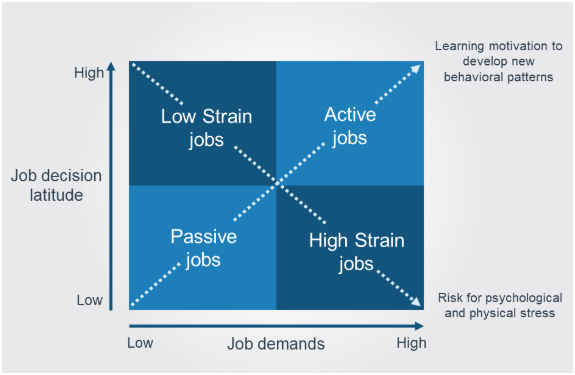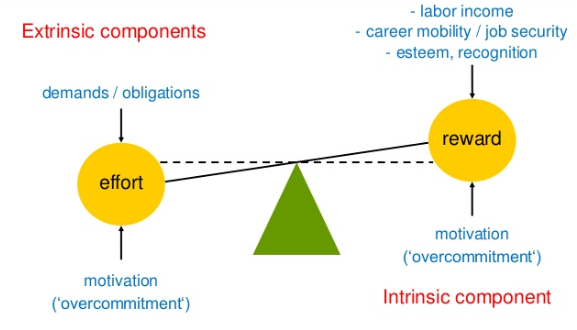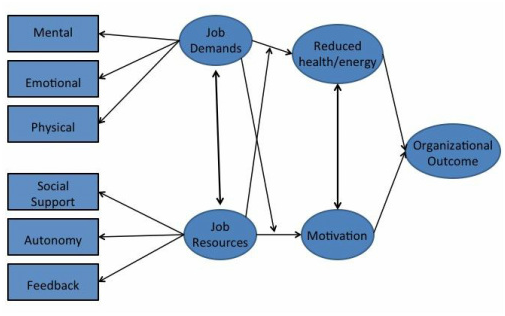Employment Quality Assignment:Discuss Different Theoretical Models And Practices
Question
Task: You are required to apply theoretical frameworks from the course to (a) analyse the quality of a job and (b) to make recommendations on how the job could be improved for the benefit of the individual and the benefit of the organisation (or without causing harm to the organisation). This is to be expressed in an essay of no more than 2000 words.
You may pick a job you currently hold or have held, a job depicted in a TV series or movie, or a job described in a novel, biography or memoir you have read. Jobs must be paid forms of employment but can be in any country. Where you analyse a job depicted in a TV series, movie or novel/biography/memoir, the events related should be set in the current century or in the last half of the twentieth century.
The quality of this job includes its intrinsic and extrinsic features, and you need enough information on the job to understand these thoroughly. Relevant theoretical frameworks for analysing the job’s quality include the demand-control model, the effort-reward imbalance model, and the job demands-resources model.
This essay does not rely on you discussing sources beyond those in the course readings although such reading will be valuable for your understanding. It relies on you applying the theories in the essential resources of the course to the job you choose. In other words, this is an assignment in the application of the theory in the course, not an assignment about how widely you can read.
Answer
Introduction
Employment qualityis identified as multidimensional approach (Smits & Lenaerts 2018). Examining employment quality intends to measure diverse aspects of working conditions which determines job satisfaction and overall standard of productivity levels (Emond & Taylor 2018). The study aims to discuss different theoretical models and practices that can be integrated for job quality examination. Emphasizing credibility and informative assessment, discussion, and analysis on the bank teller’s job, which I upheld during the time I was pursuing B.com is done. Theoretical models like the demand-control model (DCM), effort-reward imbalance (ERI), and job demands-resources (JDR) is been discussed for analyzing my job quality when I was working as a bank teller. Recommendations on how and what improvement could have done for enhancing my employability skills for future benefits have been discussed.
Analyzing job quality involves applying a theoretical model or models to the situation
Three theoretical models have been identified that can be integrated for analyzing job quality, demand-control model (DCM), effort-reward imbalance (ERI), and job demands-resources (JDR). as opined by Esenaliev and Ferguson (2019), the demand-control model emphasizes on identifying the balance of job autonomy and requirements. In the context, Jones et al., (2017), mentioned that when an individual are into the state where it experiences high-demand with less or moderate control encounters more stress as compared to others and vice versa. Hence, DCM model practices can be integrated to assess the quality of work provided by an individual as to when it is evidenced that when an individual experiences a free working environment, it feels more to explore more creative and innovative solutions to overcome business contemporary issues (Van der Heijden et al., 2019). Thus, Na-Nan et al., (2018), mentioned that the DCM model helps in examine the clear role of sovereignty possessed by an individual in its working environment.
As opined by (Arranz et al., 2019), effort-reward imbalance (ERI), is formulated to identify health-adverse that effects on the stressful psychosocial work along with the employment conditions that are rapidly developing in the multinational corporations. Supporting the context, Eddy et al., (2017), stated that the ERI model helps in assuming the existing exposure to the uncounted experience of the failed reciprocation situations at work in aspect to low gain/high gain. Besides, it is experienced that incidences give rise to the risk associated with stress disorder which includes coronary heart disease and depression. Siegrist & Li (2016), stated that ERI argues that poor health and job dissatisfaction occurs to an individual when they perceive that their efforts are eventually huge as compared to their rewards. This directly impacts on the job quality and outcomes of productivity. Finally, the job demands-resources model (JD-R) is developed to evaluate occupational stress that suggests strains in a response to an imbalance between individual demand and the resources it receives after dealing with those demands. Hence, this model can be used to identify the job quality one individual is rendering by examining their high or low strains towards its job demands and its resources by analyzing the interrelation of both the variables.
A bank teller’s job
As depicted by Eddy et al.., (2018), the job of the bank teller is to handle financial transactions of the customers in associated with money orders, money transfers, withdrawals, deposits and other such related activities. As a bank teller, my duties also include counting cash received, attending calls, managing ATM deposits, balancing the numbers, and filling deposit slips and other paper works. Rather than the above-mentioned duties and responsibilities, a bank teller can also be asked for advice on accounting activities by the management head of the banking sector. However, my role as a bank teller was allocated at a suburban branch where there is only 9 more staff to handle all the banking-related activities. Besides, I was appointed as a part-time worker as coordinately I have to attend my ab.com college and tuition in the day time. Thus, it can be observed, my work as a bank teller is temporary. The reason for selecting this profession for my part-time is because I assumed that I possess quite accurate skills in mathematics, customer service skill, computer skills, job outlook skill along with effective communication skills. I assumed that working as a bank teller would help me in enhancing my cognitive skills like sustaining attention, working memory, recognizing patterns along with skills in multitasking which would help me in sustaining accurate job resources as well as now. As depicted by Siegrist (2016), working coordinatingly while pursuing universities help an individual in enhancing its soft skill like problem-solving, work ethics, emotional intelligence, leadership skills along with problem-solving skill which can trigger diverse future career opportunities for growth and development.
A bank teller’s job: demands
According to Schaufeli (2017), accuracy and speed are identified as crucial requirements in aspects to operate a computer with an ability to quickly record financial and accounting entries of its customers. Besides, the bank teller must be quick in counting notes and deposit slips along with professional skills in balancing the overall amount at the end of the shift. Due to fewer workers in the bank, I am responsible for overlooking all the queries of the bank customers related o their account or additional information related to banking services. As per the role of bank teller, although temporary, I am responsible totally all the accounting transactions that would have occurred on an everyday basis. This howevere is constituted as the challenging demand from me as I have to maintain a track record even for that transaction which is not performed by me or is performed during my absence.
Other bank teller qualifications like rendering attention to the details, mathematical skills, skills in influencing customers so that they can confidentially take additional services provided/ offered by the bank (Dicke et al., 2018). According to Cendales-Ayala et al., 2017), soft skills like verbal communication, financial skill, skills in using financial software and documentation skills are identified as another crucial bank teller job demands. However, all the mentioned skills are required and is demanded in the bank I worked during my graduation are essential due to the limited presence of staff and respectively high pressure of work. Due to my strong academic past and pursued knowledge in Economic, accounting and other commerce-related subjects I successfully collaborate with the job demands required as a bank teller. However, it can be evaluated that my banker does not follow Taylorism Principles in which responsibilities are shifted on the managers of the corporation.
Notwithstanding the above discussion, the pressure of work entirely depends on the range of customer visits in that particular branch. Sometimes the intensity also increases due to the absence of staff for serving the clients. As depicted by Wu (2016), a shortage of staff leads in creating hindrance of demands. Besides, the equipment that are issued for the help and assistance of bankers are traditional due to which the time is consumed more. On the contrary, the financial software assembled is very efficient in recording the financial transaction, along with help in detecting errors that occur due to human irresponsive nature. However, there are many customers who act politely but are not that friendly in nature. They considered us as emotional financial associates or labor for which they have to be polite. Hence, there is no sort of enjoyment or any spiritual satisfaction in conducting the job role as a bank teller in such a bank.
A bank teller’s job: resources
Before starting with my job profession, I was provided 2 days of corporate training which can be assessed as the resource that I gained foremost after joining this bank as bank teller. Verhofstadt et al., (2017), mentioned that corporate or professional training are essential as it enables an individual to understand its job role and duties along with standard principles according to which task are required to be performed. Besides, the friendly environment and cooperative behaviors from the executives helped me in gaining the required support for managing massive activities, even though being a part-time worker. The main feedback I strive was from the result of final balance rather than that of the supervisor because if the balance is matched/tally this evaluates that no errors or mistakes were conducted. Another resource that I possessed working here was the peer support. Hence, I generally get help whenever I experience difficulties during peak periods or with an unusual transaction. The standard of work is accurate as there is less autonomy, despite the feeling of competition was noticed in 3-4 staff.
Howevere, in the context of financial resources, the salary was depicted from the award rate which is negotiated with the union. This practice is evaluated versus the employment laws. Besides, it was observed that the growth of the bank as an organization was accurate which could offer candidates employment opportunities as well as career possibilities to grow. Besides, no such management initiated in aspects to voice opportunities was promoted which can ensure strong support to employees. Thus, it is determined that Socio-technical system (STS) is incorporated into our organization system which renders advocating unity in execution, control and preparations.
A bank teller’s: intrinsic and extrinsic features
Intrinsic factor is referred to as attitude of the corporate associates with their colleagues. In my working place, I have found supportive nature from my peers which has helped me in collaborating with changes and during difficult times. In the terms of extrinsic factor, the environment of the bank for which I work is accurate. The work pressure is high only when more than two staff take leave on a same day or during the time when the number of visitors are relatively high.
Job quality assessment

Figure 1: Job Demand Control Model
(Source: Esenaliev and Ferguson (2019)
From the above discussion on the DCM analysis, it can be assessed that I encountered in the middle break-even point of DCM graph as neither I encounter high strain job nor sustain low strain job. As the demands vary only when any staff or staffs are absent or during the time of difficult accounting transactions, in aspects to intrinsic factor. However, in the context of low strain job I get required support from my peers whenever necessary like during peak periods. On the contrary, job decision latitudes are relatively low and are passive jobs as the standard, policies and procedures of the bank do not encourage any employee to develop a new behavioral pattern for self-development and organizational well-being, falling the condition under extrinsic factor. Rather than this, the opportunities to develop and learn is very limited and few.

Figure 2: Effort-Reward Imbalance Model
(Source: Arranz et al.,2019)
Analyzing the above criteria of the ERI model along with the discussion on job demands and resources, it can be evaluated that the rewards and efforts were fairly balanced. Security for the job was never an issue, the quantity of work available was fluctuating based on an unusual situation as well as the pay was fair and standard. Beside, after evaluating intrinsic and extrinsic factors also, reward that are provided in the bank is observed to be efficient as my peers are always ready for providing necessary help and assistance.

Figure 3: Job Demands-Resources Model
(Source: Hessels et al., 2017)
Analyzing discussion on the job demand along with the resources with the JD-R model, it can be assessed that the demand was reasonable, although as a part-time worker I felt that the stress and pressure of work are comparatively more. Besides, the system of calculating the resources like financial gains was found accurate as per the work provided. Hence, it is observed that comparing demands and resources that I was sustaining from the job of bank teller was motivating and encouraging for me. My target for developing my potential areas was successful and I developed both cognitive and soft skills like problem-solving, resource management, financial software usage and work ethics. Taking assistance from the JD-R model it can be evaluated that as the three elements in the model, social support, less autonomy and feedbacks were encompassed I possessed quite a moderate job quality. To sustain effective benefits from the current work, my intrinsic and extrinsic factors effectively encompass with social support, high feedback and autonomy.
Recommendations
It can be suggested that executives are required to put more effort into appreciating their employees, both part time and full-timer, to avoid any kind of aggressive competition. Besides, this would help every employee to get an opportunity and to prove their potential capabilities. Training and development programs must be organized every month ensuring encouragement within the employees related to their self-development as well as the well-being of the corporation. Supervisors are observed to have biased nature in aspects to people managerial skills which could adhere to a direct impact on the employee’s turnover and retention.
Conclusion
From the above discussion it can be determined that after integrating theoretical frameworks, the job of bank teller was suitable for me and hence helped in achieving targeted goals of developing potential skills. I developed strong commercial experience along with cognitive and professional skills under accurate pay. Therefore, my chance to get a suitable job position after completing my studies is increased.
References
Arranz, J. M., García-Serrano, C., & Hernanz, V. (2019). Job quality differences among younger and older workers in Europe: The role of institutions. Social science research, 84, 102345.
Cendales-Ayala, B., Useche, S. A., Gómez-Ortiz, V., & Bocarejo, J. P. (2017). Bus operators’ responses to job strain: An experimental test of the job demand–control model. Journal of occupational health psychology, 22(4), 518.
Dicke, T., Stebner, F., Linninger, C., Kunter, M., & Leutner, D. (2018). A longitudinal study of teachers’ occupational well-being: Applying the job demands-resources model. Journal of occupational health psychology, 23(2), 262.
Eddy, P., Wertheim, E. H., Hale, M. W., & Wright, B. J. (2018). A systematic review and meta-analysis of the effort-reward imbalance model of workplace stress and hypothalamic-pituitary-adrenal axis measures of stress. Psychosomatic medicine, 80(1), 103-113.
Eddy, P., Wertheim, E. H., Kingsley, M., & Wright, B. J. (2017). Associations between the effort-reward imbalance model of workplace stress and indices of cardiovascular health: A systematic review and meta-analysis. Neuroscience & Biobehavioral Reviews, 83, 252-266.
Emond, B., & Taylor, J. Z. (2018). The importance of measuring food safety and quality culture: results from a global training survey. Worldwide Hospitality and Tourism Themes.
Esenaliev, D., & Ferguson, N. T. (2019). The Impact of Job Quality on Wellbeing: Evidence from Kyrgyzstan. Social Indicators Research, 144(1), 337-378.
Hessels, J., Rietveld, C. A., & van der Zwan, P. (2017). Self-employment and work-related stress: The mediating role of job control and job demand. Journal of Business Venturing, 32(2), 178-196. Jones, W., Haslam, R., & Haslam, C. (2017). What is a ‘good’job? Modelling job quality for blue collar workers. Ergonomics, 60(1), 138-149.
Na-Nan, K., Chaiprasit, K., & Pukkeeree, P. (2018). Factor analysis-validated comprehensive employee job performance scale. International Journal of Quality & Reliability Management.
Schaufeli, W. B. (2017). Applying the job demands-resources model. Organizational Dynamics, 2(46), 120-132.
Siegrist, J. (2016). Effort-reward imbalance model. In Stress: Concepts, cognition, emotion, and behavior (pp. 81-86). Academic Press.
Siegrist, J., & Li, J. (2016). Associations of extrinsic and intrinsic components of work stress with health: a systematic review of evidence on the effort-reward imbalance model. International journal of environmental research and public health, 13(4), 432.
Smits, I., & Lenaerts, K. (2018). INPUT NOTE ON NORMATIVE STANDARDS FOR JOB QUALITY INDICATORS.
Verhofstadt, E., Baillien, E., Verhaest, D., & De Witte, H. (2017). On the moderating role of years of work experience in the Job Demand–Control model. Economic and Industrial Democracy, 38(2), 294-313.
Wu, C. H. (2016). Personality change via work: A job demand–control model of Big-five personality changes. Journal of Vocational Behavior, 92, 157-166.












